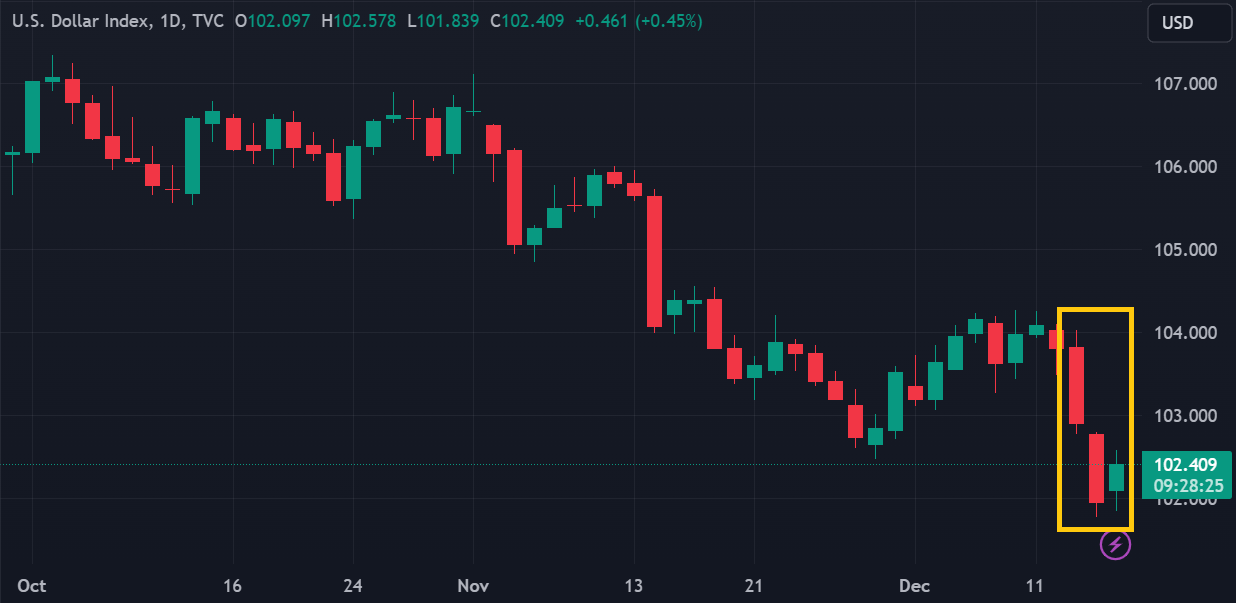The US Dollar Index (DXY) managed to rebound and attempt to form support at around 102.00 before the release of the US Purchasing Managers' Index (PMI).
Both the Euro and Sterling exchange rates shot up thanks to yesterday's central bank announcements. However, both receded simultaneously today (15/December) due to the recession in business activity data in the Eurozone and the UK.
EUR/USD was rejected from the 1.1000 threshold and fell more than 0.6% to the 1.0900 range. GBP/USD weakened around 0.4% to the 1.2700 range. On the other hand, the US Dollar Index (DXY) managed to rebound and attempted to form support near the 102.00 range.

The preliminary Eurozone Manufacturing and Services PMI reports signaled a sustained slowdown by December 2023. The Manufacturing PMI score stagnated at 44.2, whereas the consensus expected a slight improvement to 44.6. The Services PMI even slipped from 47.6 to 47.0, much weaker than the estimate pegged at 48.0.
The figures cast doubts on the commitment of the European Central Bank (ECB) in its efforts to maintain high interest rates. Markets are again considering the prospect of an ECB rate cut from March - a speculation that had been ruled out after yesterday's ECB announcement.
"The lack of material improvement in Eurozone preliminary PMIs for December today could dampen the relative optimism embedded in the ECB and EUR," said Valentin Marinov, Head of G10 FX Strategy at Crédit Agricole.
The UK PMI preliminarily report looked slightly better with a mixed performance. The UK Manufacturing PMI score slipped from 47.2 to 46.4, which was worse than the estimate pegged at 47.5. However, the UK Services PMI score climbed from 50.9 to 52.7 - outperforming the consensus estimate of 51.0.
Given that the services sector dominates the UK economy, the data confirms the BoE's policy stance which remained hawkish yesterday. This situation provided more energy for GBP to struggle against USD.
"The Euro Area economy looks to be heading for a technical recession in the fourth quarter," said Matthew Ryan, Chief Market Strategist at Ebury, "In contrast, the UK economy looks to be in much healthier shape... this should ease investor concerns around a possible recession in the UK and justify the Bank of England's stance on 'higher for longer' interest rates."
S&P's US PMI report (preliminary) depicted a similar situation to the UK. The US Manufacturing PMI score slipped from 49.4 to 48.2, whereas the previous consensus anticipated only a decline to 49.3. However, the US Services PMI score climbed significantly from 50.8 to 51.3 - much better than the forecast of 50.6.

 Dedicated FREE FOREX VPS
Dedicated FREE FOREX VPS Free FOREX Virtual Private Server
Free FOREX Virtual Private Server MT4 Demo Contest, Get $500
MT4 Demo Contest, Get $500 Sign Up for an Account, Claim 60% Deposit Bonus
Sign Up for an Account, Claim 60% Deposit Bonus Free MT4/MT5 VPS 2024
Free MT4/MT5 VPS 2024 Send E-mail and Get Free Merchandise
Send E-mail and Get Free Merchandise $1K Refer a Friend Bonus for Pepperstone Pro clients
$1K Refer a Friend Bonus for Pepperstone Pro clients Maximize Your Earnings with 100% Deposit bonus
Maximize Your Earnings with 100% Deposit bonus Trade to Win, $5,000 Monthly Demo Contest
Trade to Win, $5,000 Monthly Demo Contest Claim 30% + 15% Deposit Bonus from LiteFinance
Claim 30% + 15% Deposit Bonus from LiteFinance






